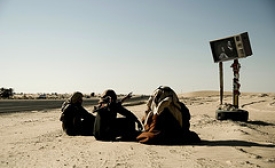arab world
WASHINGTON -- From events of the past three weeks a number of lessons can be drawn, some old and some new:
First, the phrase "the Arab street" has been redefined by Tahrir Square. We don’t need acute listening agents or polling to see what the Arab world wants.
As the tsunami of popular revolt continues eastward from Tunisia towards the Arab heartland, engulfing Egypt and threatening the autocracies of Jordan and Yemen, it has inevitably drawn comparison with a similar wave two decades ago.
As events in Egypt move forward, the United States has appeared to be a befuddled bystander, reacting slowly and with a muted voice that cannot be heard above the din of those demanding freedom.
While significant attention has been given to how political groups in the Arab world use the media to intimidate enemies and instill fear in times of conflict, the use of public diplomacy by local and regional actors in the region remains understudied. This project examined the use of public diplomacy by non-state actors in the Arab world, including Islamist groups.

This project examined core issues at the intersection of media and public diplomacy in the Middle East from 2004 to 2005.







